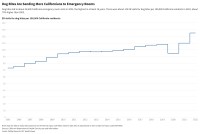Latest KFF Health News Stories
Watch: Many Americans Are Unaware of HIV Prevention Medication
Some Americans mistakenly believe medication to prevent HIV transmission through sex is just for certain groups such as gay men, but anyone who’s at risk for contracting HIV through sex could benefit.
What the Health? From KFF Health News: Maybe It’s a Health Care Election After All
Health care wasn’t expected to be a major theme for this year’s elections. But as President Joe Biden and former President Donald Trump secured their respective party nominations this week, the future of both Medicare and the Affordable Care Act appears to be up for debate. Meanwhile, the cyberattack of the UnitedHealth Group subsidiary Change Healthcare continues to do damage to the companies’ finances with no quick end in sight. Margot Sanger-Katz of The New York Times, Anna Edney of Bloomberg News, and Joanne Kenen of Johns Hopkins University and Politico Magazine join KFF Health News’ Julie Rovner to discuss these issues and more. Also this week, Rovner interviews Kelly Henning of Bloomberg Philanthropies about a new, four-part documentary series on the history of public health, “The Invisible Shield.” Plus, for “extra credit” the panelists suggest health policy stories they read this week that they think you should read, too.
An Arm and a Leg: The Medicare Episode
On this episode of “An Arm and a Leg,” host Dan Weissmann breaks down the complicated and expensive world of Medicare with practical tips to pick the right plan and avoid penalties.
What the Health? From KFF Health News: The State of the Union Is … Busy
At last, Congress is getting half of its annual spending bills across the finish line, albeit five months after the start of the fiscal year. Meanwhile, President Joe Biden delivers his annual State of the Union address, an over-the-counter birth control pill is (finally) available, and controversy erupts over new public health guidelines for covid-19 isolation. Alice Miranda Ollstein of Politico, Sarah Karlin-Smith of the Pink Sheet, and Sandhya Raman of CQ Roll Call join KFF Health News’ Julie Rovner to discuss these issues and more. Also this week, Rovner interviews Neera Tanden, the White House domestic policy adviser, about Biden’s health agenda. Plus, for “extra credit,” the panelists suggest health policy stories they read this week that they think you should read, too.
Statistical Models vs. Front-Line Workers: Who Knows Best How to Spend Opioid Settlement Cash?
A mathematical model designed to direct spending of opioid settlement funds is at the center of a debate over whether to invest in technology to guide long-term decisions or focus on the immediate needs of people in addiction.
What the Health? From KFF Health News: Alabama’s IVF Ruling Still Making Waves
Lawmakers in Congress and state legislatures are scrambling to react to the ruling by the Alabama Supreme Court that frozen embryos created for in vitro fertilization are legally children. Abortion opponents are divided among themselves, with some supporting full “personhood” for fertilized eggs, while others support IVF as a moral way to have children. Rachel Cohrs of Stat, Riley Griffin of Bloomberg News, and Joanne Kenen of the Johns Hopkins University schools of nursing and public health and Politico Magazine join KFF Health News’ Julie Rovner to discuss these issues and more. Also this week, Rovner interviews University of Pittsburgh law professor Greer Donley, who explains how a 150-year-old anti-vice law that’s still on the books could be used to ban abortion nationwide. Plus, for “extra credit,” the panelists suggest health policy stories they read this week that they think you should read, too.
An Arm and a Leg: Wait, Is Insulin Cheaper Now?
Did the price of insulin go down? It’s not quite that simple. On this episode of “An Arm and a Leg,” producer Emily Pisacreta explores recent changes to the cost of the diabetes medication.
Without Medicare Part B’s Shield, Patient’s Family Owes $81,000 for a Single Air-Ambulance Flight
Sky-high bills from air-ambulance providers have sparked complaints and federal action in recent years. But a rural Tennessee resident fell through the cracks of billing protections — and a single helicopter ride could cost much of her estate’s value.
What the Health? From KFF Health News: Alabama Court Rules Embryos Are Children. What Now?
In a first-of-its-kind ruling, the Alabama Supreme Court has determined that embryos created for in vitro fertilization procedures are legally people. The decision has touched off massive confusion about potential ramifications, and the University of Alabama-Birmingham has paused its IVF program. Meanwhile, former President Donald Trump is reportedly planning to endorse a national 16-week abortion ban, while his former administration officials are planning further reproductive health restrictions for a possible second term. Lauren Weber of The Washington Post, Rachana Pradhan of KFF Health News, and Victoria Knight of Axios join KFF Health News’ Julie Rovner to discuss these issues and more. Plus, for “extra credit,” the panelists suggest health policy stories they read this week that they think you should read, too.
The Powerful Constraints on Medical Care in Catholic Hospitals Across America
The expansion of Catholic hospitals nationwide leaves patients at the mercy of the church’s religious directives, which are often at odds with accepted medical standards.
What the Health? From KFF Health News: Biden Wins Early Court Test for Medicare Drug Negotiations
A federal district court judge dismissed a lawsuit attempting to invalidate the Biden administration’s Medicare prescription-drug price negotiation program. But the suit turned on a technicality, and several more court challenges are in the pipeline. Meanwhile, health policy pops up in Super Bowl ads, as Congress approaches yet another funding deadline. Alice Miranda Ollstein of Politico, Lauren Weber of The Washington Post, and Rachel Cohrs of Stat join KFF Health News’ Julie Rovner to discuss these issues and more. Plus, for “extra credit,” the panelists suggest health policy stories they read this week they think you should read, too.
Watch: The Feds Reexamine Covid Protocols. Here’s Why You Should Care.
KFF Health News’ Céline Gounder explains the “five-day rule” on covid safety, how guidelines and testing have evolved, and how best to protect yourself and others.
For the first time, a jury has convicted a parent of a school shooter of charges related to the child’s crime, finding a mother in Michigan guilty of involuntary manslaughter and possibly opening a new legal avenue for gun control advocates. Meanwhile, as the Supreme Court prepares to hear a case challenging the FDA’s approval of the abortion drug mifepristone, a medical publisher has retracted some of the journal studies that lower-court judges relied on in their decisions. Alice Miranda Ollstein of Politico, Sarah Karlin-Smith of the Pink Sheet, and Rachana Pradhan of KFF Health News join KFF Health News’ Julie Rovner to discuss these issues and more. Plus, for “extra credit,” the panelists suggest health policy stories they read this week that they think you should read, too.
Cities Know That the Way Police Respond to Mental Crisis Calls Must Change. But How?
Cities are experimenting with new ways to meet the rapidly increasing demand for behavioral health crisis intervention, at a time when incidents of police shooting and killing people in mental health crisis have become painfully familiar.
What the Health? From KFF Health News: The Struggle Over Who Gets the Last Word
As science skepticism pervades politics, the Supreme Court will soon consider two cases that seek to define the power of “experts.” Meanwhile, abortion opponents are laying out plans for how Donald Trump, if reelected as president, could effectively curtail abortion even in states where it remains legal. Sandhya Raman of CQ Roll Call, Joanne Kenen of Johns Hopkins University and Politico Magazine, and Sarah Karlin-Smith of the Pink Sheet join KFF Health News’ Julie Rovner to discuss these issues and more. Also this week, Rovner interviews Samantha Liss, who reported and wrote the latest KFF Health News-NPR “Bill of the Month” feature about a husband and wife who got billed for preventive care that should have been fully covered.
Is the Nation’s Primary Care Shortage as Bad as Federal Data Suggest?
Federal policymakers have been trying for a long time to lure more primary care providers to understaffed areas. The Biden administration boosted funding in 2022 to address shortages and Sen. Bernie Sanders (I-Vt.) pushed sweeping primary care legislation in 2023. But when KFF Health News set out last year to map where the primary care workforce shortages really are — and where […]
An Arm and a Leg: Self-Defense 101: Keeping Your Cool While You Fight
On this episode of “An Arm and a Leg,” host Dan Weissmann seeks advice for fighting unfair medical bills from an unexpected source: an expert in self-defense.
A Record Number of Californians Are Visiting Emergency Rooms for Dog Bites
There were nearly 50,000 emergency room visits for dog bites in California in 2022. The rate of such visits per capita is up about 70% since 2005.
What the Health? From KFF Health News: Health Enters the Presidential Race
New Hampshire voters have spoken, and it seems increasingly clear that this November’s election will pit President Joe Biden against former President Donald Trump. Both appear to be making health a key part of their campaigns, with Trump vowing (again) to repeal the Affordable Care Act, and Biden stressing his support for contraception and abortion rights. Meanwhile, both candidates will try to highlight efforts to rein in prescription drug prices. Alice Miranda Ollstein of Politico, Anna Edney of Bloomberg News, and Jessie Hellmann of CQ Roll Call join KFF Health News chief Washington correspondent Julie Rovner to discuss these issues and more. Also this week, Rovner interviews Sarah Somers of the National Health Law Program about the potential consequences for the health care system if the Supreme Court overturns a key precedent attempting to balance executive vs. judicial power.
The Colonoscopies Were Free. But the ‘Surgical Trays’ Came With $600 Price Tags.
Health providers may bill however they choose — including in ways that could leave patients with unexpected bills for “free” care. Routine preventive care saddled an Illinois couple with his-and-her bills for “surgical trays.”

















